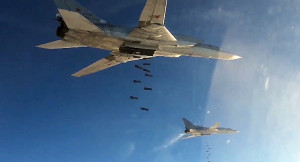
Given the on-going diplomatic spate between Turkey and the U.S., and given the cold-shouldering of Erdogan by NATO counterparts at the recent summit meeting of the alliance in Warsaw, it is not difficult to see that contradictions between Turkey and the West are coming to surface and are of fundamental nature (read: the U.S. warning that Turkey’s NATO membership will be under enhanced scrutiny marks an escalation of the heated rhetoric that has characterized US-Turkey relations in the days following the attempted coup. For Erdogan, however, this tussle implies a perpetual threat to his rule and country—a situation that he would not have to face if aligned with Russia in Syria).
It has escalated on Turkey’s side, too: Over the weekend, Ankara called on the U.Ss to extradite the Turkish preacher and political figure Fethullah Gülen, who self-exiled to Pennsylvania in 1999, but is widely is believed to have been implanted by the CIA against Erdogan. Erdogan has accused Gülen of orchestrating the coup from afar, and he warned that anyone who harbours such plotters would be considered “at war” with Turkey.
The U.S. warning regarding an “excommunication” from NATO is, many believe, premised on pre-empting any possible rapprochement between Turkey and Russia. As a matter of fact, it seems too simplistic to ignore that coup was attempted at a time when considerable way had already been covered regarding rapprochement between them, causing alarm bells to ring loudly in Washington and prompting the neocons to review Erdogan’s position in their agenda.
As such, were Turkey to step away from the U.S. agenda of encircling Russia in the Black Sea and threaten Crimea and were Turkey to start a rollback from directly intervening in Syria (read: Turkey has not only apologized to Russia for shooting down its jet, it reportedly has sent a similar sort of apology to Syria also), it will sound a the death knell not only for the ‘regime change’ agenda in that country pursued by the US and regional allies but also for larger strategic objectives that the U.S. led block is pursuing.
There is, as such, an excellent opportunity for Russia to cash in on the Turkey-U.S. troubled relations by normalizing its own relations with Turkey. As the events have indicated and the way Turkey’s leadership has turned ‘anti-U.S.’ after the last Friday coup-attempt, it goes well beyond simple guess work that the U.S. establishment was involved in facilitating Erdogan’s overthrow. Bizarre as it may sound, ‘regime change’ agenda of the neocons in the U.S. in Syria is now predicated on the overthrow of Erdogan first. For Turkey, Russia’s goodwill is vital for preventing the emergence of a Kurdish enclave/independent Kurdistan along its border, which is a core issue.
The coup-attempt is a grim reminder of the bad policies Turkey has been following for past two-three years and that have now come to haunt his own country. The realization in Turkey is quite obvious and its revamped relations with Russia are in the hindsight. The protagonists may have specific interests in Syria, but the bottom line is that Turkey is under enormous pressure to abandon the disruptive role it has played so far by supplying and equipping Syrian opposition groups.
A fundamental change in Turkey’s role in Syria is therefore of vital importance for any concrete co-ordination with Russia. There are some signs that indicate this change. For instance, Syrian National Coalition, which is supported by Turkey, demanded immediate halt to air strikes in Manjib which, Pentagon, of course, promptly rejected. On the other hand, Russian response was quite measured. The foreign ministry spokesperson Maria Zakharova said, “If these horrible facts are confirmed, proper conclusions will have to be drawn and all necessary measures taken to obviate the recurrence of anything of the kind in the future.”
Russia, as is obvious, is walking a fine line ahead of Kerry’s meeting with his Russian counterpart with regard to increasing bi-lateral co-ordination between their countries. It seems prepared to extend a hand of co-operation to Turkey if it is prepared to, as Lavrov aid on Friday, “take steps against those who finance terrorists in Syria”
With Turkey ready to sit with Russia and with the U.S. government willing to extend co-operation with Russia against terrorists, although Pentagon continues to express deep scepticism over the possibility and feasibility of this co-operation, Russia’s position is Syria has certainly elevated to a point of definite leverage over all other stakeholders.
The Obama administration cannot afford to overlook the intelligence reports that Nusra Front, al-Qaeda’s affiliate in Syria, is planning to attack targets in the West. Simply put, the Russian prognosis is coming true. And with the U.S. under pressure due to Turkey’s anger, Russian diplomacy will be in top gear in the months to come.
Salman Rafi Sheikh, research-analyst of International Relations and Pakistan’s foreign and domestic affairs, exclusively for the online magazine “New Eastern Outlook”.
